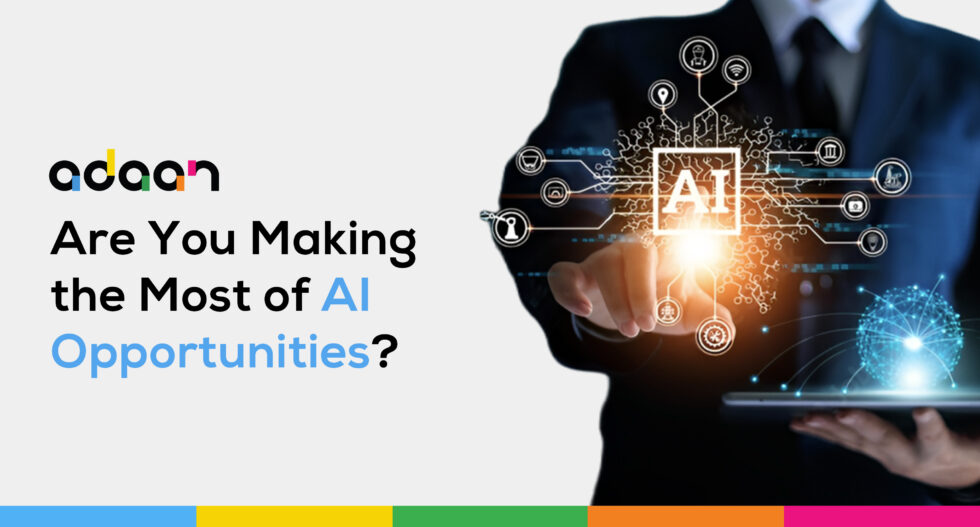In a world where staying ahead of the competition is a never-ending race, one technology has emerged as the ultimate secret weapon for businesses: Artificial Intelligence (AI). With its remarkable capacity to automate tasks, personalize customer experiences, and make data-driven decisions, AI has become the catalyst for a business revolution.
But the true power of AI extends far beyond mundane tasks. It possesses an uncanny ability to decipher the intricate complexities of each customer’s unique desires and preferences. Imagine a world where businesses can anticipate your needs before you even realize them. AI-driven algorithms can analyze copious amounts of data, sifting through digital footprints and online behaviours to craft hyper-personalized experiences tailored precisely to your tastes.
From customized product recommendations to tailored marketing campaigns, AI empowers businesses to forge intimate connections with their customers, fostering unwavering loyalty and unparalleled satisfaction. In a world where time is the most precious currency, AI swoops in as the saviour of efficiency, liberating businesses from the shackles of manual labour.
In this article, we will dive into the world of AI and unleash its power for scaling your business.
Understanding the Potential of Artificial Intelligence
Artificial Intelligence (AI) has the incredible potential to completely transform different aspects of our lives, including business, healthcare, education, and entertainment. Let’s explore some key areas where AI can make a significant impact:
-
Automation and Efficiency: AI can take over those repetitive and mundane tasks, allowing for more time to focus on more creative and complex work. This has the potential to boost productivity and efficiency across industries like manufacturing, logistics, and customer service.
-
Decision-Making and Predictive Analytics: AI algorithms have the ability to analyze enormous volumes of data and uncover patterns and trends that may go unnoticed by humans. This empowers AI to make data-driven decisions and predictions in fields such as finance, marketing, and risk assessment, resulting in more accurate and well-informed outcomes.
-
Personalized Experiences: AI can analyze user data and tailor experiences and services to individual preferences. This is especially valuable in areas like personalized marketing, content recommendations, and healthcare diagnostics, where AI can offer customized solutions and recommendations based on specific user needs.
-
Healthcare and Medicine: AI has the potential to revolutionize healthcare by assisting in early disease detection, drug discovery, and personalized treatment plans. By analyzing medical data such as images, patient records, and genomic information, AI algorithms can improve diagnoses, predict disease progression, and optimize treatment strategies.
-
Natural Language Processing and Communication: AI-powered natural language processing (NLP) enables machines to understand and generate human language. This capability is essential for applications like virtual assistants, chatbots, and language translation, making human-computer interaction more natural and seamless.
-
Autonomous Systems: AI plays a vital role in the development of autonomous systems like self-driving cars and drones. These systems utilize AI algorithms to perceive their surroundings, make decisions, and navigate complex environments, with the potential to enhance transportation, logistics, and public safety.
-
Creativity and Content Generation: AI can even generate creative content, such as art, music, and literature. With advancements in generative AI models, machines can compose music, produce artwork, and even write stories, opening up new avenues for creativity and collaboration between humans and machines.
Enhancing Operations through AI Automation
One of the transformative aspects of AI is enterprise cognitive computing (ECC), which involves the integration of AI algorithms into business applications to enhance operational efficiency. ECC applications have the ability to automate repetitive and formulaic tasks, resulting in significant improvements in the speed, reliability, and accuracy of information analysis.
For instance, consider ECC call centre applications. These applications are designed to handle customer calls swiftly, providing responses within seconds on a 24/7 basis. With advanced AI capabilities, ECC can accurately address customer issues during the first call a remarkable 90% of the time. This level of performance is achieved by reducing search time and processing large volumes of data to inform decision-making processes.
The potential of ECC to revolutionize business operations and deliver substantial value remains high. With ongoing advancements in AI technologies and greater awareness of the benefits, more organizations are expected to explore and implement ECC solutions.
Unleashing AI in Customer Experience
Practitioners are turning to AI to enhance customer experiences during the fourth industrial revolution. According to a global online survey conducted between 2016 and 2017, only 15% of firms reported having no plans related to AI. This demonstrates the widespread recognition of AI’s potential for competitive advantage.
Here are some key ways AI can be harnessed to enhance customer experience:
-
Personalized Interactions: AI algorithms can analyze customer data, including preferences, purchase history, and browsing behaviour, to deliver personalized experiences. AI-powered chatbots and virtual assistants can engage in natural language conversations, understand customer needs, and provide tailored recommendations, creating more personalized and engaging customer interaction.
-
Intelligent Customer Support: AI chatbots can provide instant and consistent customer support, addressing common queries and resolving issues 24/7. With machine learning capabilities, these chatbots continuously learn from interactions and improve their responses over time, leading to more efficient and effective customer service.
-
Predictive Analytics: AI algorithms can analyze vast amounts of customer data to predict customer behaviour and preferences. This enables businesses to anticipate customer needs, tailor marketing campaigns, and offer personalized product recommendations, enhancing customer satisfaction and driving sales.
-
Voice and Image Recognition: AI-powered voice recognition enables voice-based interactions, allowing customers to navigate through menus, place orders, and receive assistance using voice commands.
-
Proactive Customer Engagement: AI can proactively engage with customers through personalized notifications, reminders, and recommendations based on their preferences and behaviours. This helps businesses stay connected with customers, provide timely information, and nurture long-term relationships.
Driving Data-driven Decision-making with AI
Data-driven decision-making refers to the practice of businesses relying on data sets, insights, and patterns to inform their decision-making process, prioritizing factual information over instinct or intuition.
Essentially, data-driven decision-making empowers brands to assess the effectiveness of their strategies by measuring Key Performance Indicators (KPIs) and relevant metrics. Tracking and analyzing verified data points allows businesses to determine if their goals are being achieved and make informed decisions based on the evidence provided by the data.
The collaboration between AI and humans in decision-making is highly effective because both possess significant processing capabilities.
Humans bring a rational and pragmatic approach to decision-making, considering various factors and perspectives. AI, on the other hand, excels at analyzing data and reducing the influence of cognitive biases.
While “data-driven” and “AI-driven” may seem similar at first glance, AI decision-making goes beyond simply aggregating data into dashboards. AI processes data, extracting valuable insights, running multiple scenarios, and making predictions and categorizations based on potential outcomes.
AI enables data-driven decision-making through:
-
Analyzing large and complex datasets, uncovering patterns, trends, and correlations that might go unnoticed by humans.
-
Utilizing historical data and machine learning algorithms to make predictions about future outcomes. This capability allows businesses to anticipate trends, forecast demand, and make proactive decisions to optimize operations and achieve better business outcomes.
-
Allowing systems can analyze customer data and behaviour to provide personalized suggestions and recommendations. This enables businesses to offer tailored products, services, and experiences to customers, enhancing customer satisfaction and driving revenue growth.
-
Assessing risks by analyzing historical data and identifying patterns associated with potential risks.
-
Processing and analyzing data in real time, providing up-to-date insights that enable timely decision-making. This is particularly valuable in fast-paced industries where quick responses and agile decision-making are critical to success.
Personalization and AI-Powered Recommendation Systems
Personalization and AI-powered recommendation systems are closely related in the context of enhancing customer experiences. AI-powered recommendation systems leverage personalization techniques to deliver tailored suggestions and recommendations to individual customers.
Based on these insights, AI-powered recommendation systems can generate personalized recommendations for products, services, content, or experiences that are likely to be of interest to each customer. These recommendations can be delivered through various channels, such as e-commerce platforms, streaming services, social media platforms, or personalized marketing campaigns.
AI-powered personalization offers numerous benefits to businesses. Here are some of the key advantages:
-
Enhanced customer experience: AI-powered personalization tailors the customer experience to individual preferences and needs, resulting in improved satisfaction and loyalty.
-
Increased revenue: Through personalized recommendations and offers, businesses can boost the chances of customers making purchases. By aligning products and offers with individual customer preferences, AI-powered personalization enhances conversion rates and drives revenue growth.
-
Reduced customer churn: AI-powered personalization plays a crucial role in reducing customer churn. By providing personalized experiences that cater to specific needs, businesses can improve customer retention. When customers feel understood and valued, they are more likely to remain loyal.
AI for Enhanced Cybersecurity
The digital world is constantly evolving, presenting new challenges for internet users. We face threats from automated botnets that infect our devices and social engineering attacks that try to deceive us and steal our valuable information.
Researchers have noticed an alarming rise in botnet threats, especially targeting Internet of Things (IoT) devices like cameras and storage devices. Mobile devices are not immune either, with unsafe browsing accounting for a majority of mobile threats, including malware and phishing attempts.
In the battle against cybersecurity threats, AI and machine learning algorithms are our mighty allies. These smart algorithms automate decision-making processes and can detect patterns even in incomplete or changing data. By learning from real-world threats, they have the power to spot novel threats that exhibit suspicious behaviours.
AI algorithms have a remarkable knack for detecting patterns, outperforming traditional security systems. While they aren’t flawless, their quick decision-making capabilities make the user experience smoother and more secure. They can anticipate and prevent new threats by leveraging their knowledge of previous attacks and malware.
Implementing AI algorithms has already proven successful in safeguarding countless homes. By combining established cybersecurity practices with cutting-edge machine learning, we are able to thwart thousands of threats every minute.
Looking ahead, AI-driven cybersecurity holds exciting possibilities. Imagine being alerted before you access suspicious websites, including phishing sites. And with the security of AI in cloud computing deployed on routers, we can protect all devices on a network, even those incapable of running antivirus software.
Overcoming Challenges and Ethical Considerations
As artificial intelligence applications continue to advance and permeate various aspects of our lives, it becomes imperative to acknowledge and overcome the challenges and ethical considerations associated with this transformative technology. While AI holds tremendous potential to revolutionize industries and improve our lives, it also presents unique complexities that require careful attention.
Here are some challenges to be worked on:
-
Unbiased Outcomes: AI systems can inherit biases from the data on which they are trained, potentially leading to unfair outcomes or discrimination. It is crucial to ensure that AI algorithms are designed and trained to be fair, transparent, and unbiased, taking steps to identify and mitigate biases throughout the development process.
-
Privacy and Security: AI relies on vast amounts of data, often including sensitive personal information. Protecting data privacy and ensuring robust security measures are in place is essential to prevent unauthorized access, data breaches, or misuse of personal information.
-
Accountability and Transparency: AI algorithms can be complex and opaque, making it difficult to understand how they arrive at certain decisions or predictions. Ensuring transparency and accountability in AI systems is necessary to build trust and enable stakeholders to understand and evaluate the reasoning behind AI-driven outcomes.
-
Job Displacement and Workforce Changes: AI automation has the potential to replace certain job roles or change the nature of work. It is important to anticipate and plan for the impact of AI on the workforce, including reskilling and upskilling initiatives to support workers in transitioning to new roles that complement AI technologies.
-
Social and Economic Impact: AI adoption can have wide-ranging social and economic implications. It is important to consider how AI technologies may affect various stakeholders, including marginalized communities, and work towards minimizing inequalities and ensuring the benefits of AI are distributed equitably.
-
Ethical Decision Making: AI systems may need to make ethical decisions, such as in autonomous vehicles or healthcare settings. Developing ethical frameworks and guidelines for AI development and deployment is crucial to ensure that AI aligns with societal values and respects ethical principles.
-
Human-Machine Collaboration: Balancing the roles of AI and human decision-makers is important. Leveraging AI as a tool to augment human capabilities rather than replacing human judgment can lead to more effective and responsible decision-making.
While automation is becoming more prevalent, it is unlikely to lead to the complete elimination of entire job categories. Jobs that involve human interaction, empathy, and the application of judgment alongside AI technology will remain robust.
Conclusion
Maximizing the potential of AI is crucial for future success in a rapidly evolving world. AI has the power to transform industries, drive innovation, and improve our lives in countless ways. To achieve this, we must take proactive steps to harness AI’s capabilities responsibly and effectively.
Organizations need to invest in AI research and development, fostering a culture of innovation and experimentation.
Collaboration and knowledge-sharing are also essential in AI implementation for embracing partnerships and interdisciplinary approaches. Sharing best practices, insights, and data fosters a collective understanding of AI’s potential and enables faster progress.
In order to utilize the potential of AI in the best way, it is crucial to nurture a skilled AI workforce through training, reskilling, and upskilling programs. AI technologies are most effective when paired with human expertise, so fostering a human-AI collaboration mindset will be vital for future success.
The field of AI is constantly evolving, and organizations must stay informed about emerging trends, technologies, and ethical considerations. Embracing a culture of deep learning and adaptability ensures that businesses can maximize the potential of AI in the face of evolving challenges and opportunities.






